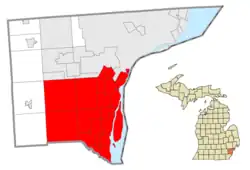River Rouge, Michigan
River Rouge (/rɪˈvɜːr ruːʒ/, French: Rivière Rouge, lit. 'red river') is a city in Wayne County in the U.S. state of Michigan.[3] The population was 7,224 at the 2020 census.[4]
River Rouge, Michigan
Rivière Rouge (French) | |
|---|---|
| City of River Rouge | |
.jpg.webp) Looking north along Jefferson Avenue | |
 Seal | |
 Location within Wayne County | |
 River Rouge Location within the state of Michigan  River Rouge Location within the United States | |
| Coordinates: 42°16′17″N 83°08′05″W | |
| Country | |
| State | |
| County | |
| Settled | 1808 |
| Incorporated | 1899 (village) 1922 (city) |
| Government | |
| • Type | Mayor–council |
| • Mayor | Michael Bowdler |
| • Clerk | Patricia Johnson |
| Area | |
| • City | 3.25 sq mi (8.41 km2) |
| • Land | 2.65 sq mi (6.87 km2) |
| • Water | 0.59 sq mi (1.54 km2) |
| Elevation | 584 ft (178 m) |
| Population (2020) | |
| • City | 7,224 |
| • Density | 2,721.93/sq mi (1,050.85/km2) |
| • Metro | 4,285,832 (Metro Detroit) |
| Time zone | UTC-5 (EST) |
| • Summer (DST) | UTC-4 (EDT) |
| ZIP code(s) | |
| Area code | 313 |
| FIPS code | 26-68760[2] |
| GNIS feature ID | 635965[3] |
| Website | Official website |
The city is named after the River Rouge, which flows along the city's northern border and into the Detroit River. The city includes the heavily industrialized Zug Island and also has its own school district, River Rouge School District.
History
The small settlement incorporated as a village in 1899 within Ecorse Township.[5] In 1922 as the city of Detroit expressed interest in annexing land in the township, the Village of River Rouge incorporated as a city on April 3 to avoid being annexed.[5] A month later Detroit completed annexation of land in the township immediately to the west of River Rouge.
One of the most important historical associations with River Rouge is its relationship to a Great Lakes freighter, the SS Edmund Fitzgerald, which sank in 1975 in a fierce storm in Lake Superior, with the loss of all 29 crew. The ship was constructed in 1958 at the Great Lakes Engineering Works in River Rouge and was the largest ship on the lakes at the time.
The city had its peak of population in 1950, when industry was the mainstay of the local economy. Restructuring of heavy industry and movement of jobs offshore have taken a toll of the city; the loss of jobs resulted in loss of population. In 2015 the population is less than half of what it was in 1950. Many workers who had the flexibility to seek jobs in other areas moved away. Outward migration has resulted in a shift in the racial demographics of the city.
Geography
According to the United States Census Bureau, the city has a total area of 3.24 square miles (8.39 km2), of which 2.65 square miles (6.86 km2) is land and 0.59 square miles (1.53 km2) is water.[6]
Of the city's land area, 0.93 square miles (2.41 km2) consists of the unpopulated Zug Island. The River Rouge forms the northern boundary with the city of Detroit, and the Detroit River forms the eastern boundary of the city. The Mariners Memorial Light is an active lighthouse located within the city along the Detroit River. Built in 2004, it is located within Belanger Park and is the newest constructed lighthouse in the state of Michigan.[7]
River Rouge contains its own post office located at 10455 West Jefferson Avenue.[8] The post office uses the 48218 ZIP Code, which covers most of River Rouge and a small section of the city of Ecorse to the south.[9][10] Zug Island uses the Detroit 48209 ZIP Code.[11][12]
Demographics
| Census | Pop. | Note | %± |
|---|---|---|---|
| 1900 | 1,748 | — | |
| 1910 | 4,163 | 138.2% | |
| 1920 | 9,822 | 135.9% | |
| 1930 | 17,314 | 76.3% | |
| 1940 | 17,008 | −1.8% | |
| 1950 | 20,549 | 20.8% | |
| 1960 | 18,147 | −11.7% | |
| 1970 | 15,947 | −12.1% | |
| 1980 | 12,912 | −19.0% | |
| 1990 | 11,314 | −12.4% | |
| 2000 | 9,917 | −12.3% | |
| 2010 | 7,903 | −20.3% | |
| 2020 | 7,224 | −8.6% | |
| U.S. Decennial Census[13] 2010-2020[14] | |||
2020 census
| Race / Ethnicity | Pop 2010[15] | Pop 2020[14] | % 2010 | % 2020 |
|---|---|---|---|---|
| White alone (NH) | 2,751 | 1,999 | 34.81% | 27.67% |
| Black or African American alone (NH) | 3,933 | 3,506 | 49.77% | 48.53% |
| Native American or Alaska Native alone (NH) | 38 | 29 | 0.48% | 0.40% |
| Asian alone (NH) | 17 | 11 | 0.22% | 0.15% |
| Pacific Islander alone (NH) | 2 | 0 | 0.03% | 0.00% |
| Some Other Race alone (NH) | 8 | 40 | 0.10% | 0.55% |
| Mixed Race/Multi-Racial (NH) | 270 | 385 | 3.42% | 5.33% |
| Hispanic or Latino (any race) | 884 | 1,254 | 11.19% | 17.36% |
| Total | 7,903 | 7,224 | 100.00% | 100.00% |
Note: the US Census treats Hispanic/Latino as an ethnic category. This table excludes Latinos from the racial categories and assigns them to a separate category. Hispanics/Latinos can be of any race.
2010 census
As of the census[16] of 2010, there were 7,903 people, 2,897 households, and 1,885 families living in the city. The population density was 2,982.3 inhabitants per square mile (1,151.5/km2). There were 3,731 housing units at an average density of 1,407.9 per square mile (543.6/km2). The racial makeup of the city was 39.4% White, 50.5% African American, 0.6% Native American, 0.2% Asian, 0.1% Pacific Islander, 4.2% from other races, and 5.0% from two or more races. Hispanic or Latino of any race were 11.2% of the population.
There were 2,897 households, of which 37.7% had children under the age of 18 living with them, 25.1% were married couples living together, 32.3% had a female householder with no husband present, 7.6% had a male householder with no wife present, and 34.9% were non-families. 29.5% of all households were made up of individuals, and 10.2% had someone living alone who was 65 years of age or older. The average household size was 2.73 and the average family size was 3.37.
The median age in the city was 33 years. 29.2% of residents were under the age of 18; 10.6% were between the ages of 18 and 24; 24.4% were from 25 to 44; 24.7% were from 45 to 64; and 11.2% were 65 years of age or older. The gender makeup of the city was 47.0% male and 53.0% female.
2000 census
As of the census[2] of 2000, there were 9,917 people, 3,640 households, and 2,504 families living in the city. The population density was 3,713.9 inhabitants per square mile (1,433.9/km2). There were 4,080 housing units at an average density of 1,528.0 per square mile (590.0/km2). The racial makeup of the city was 52.58% White, 42.01% African American, 0.78% Native American, 0.16% Asian, 0.04% Pacific Islander, 1.63% from other races, and 2.80% from two or more races. Hispanic or Latino of any race were 4.96% of the population.
There were 3,640 households, out of which 36.0% had children under the age of 18 living with them, 31.4% were married couples living together, 30.4% had a female householder with no husband present, and 31.2% were non-families. 26.3% of all households were made up of individuals, and 8.9% had someone living alone who was 65 years of age or older. The average household size was 2.72 and the average family size was 3.25.
In the city, the population was spread out, with 31.2% under the age of 18, 10.2% from 18 to 24, 29.2% from 25 to 44, 18.8% from 45 to 64, and 10.6% who were 65 years of age or older. The median age was 31 years. For every 100 females, there were 89.4 males. For every 100 females age 18 and over, there were 84.1 males.
The median income for a household in the city was $29,214, and the median income for a family was $33,875. Males had a median income of $35,613 versus $24,391 for females. The per capita income for the city was $13,728. About 19.1% of families and 22.0% of the population were below the poverty line, including 30.6% of those under age 18 and 10.5% of those age 65 or over.
Education
River Rouge School District serves River Rouge and also a small northern portion of the city of Ecorse.[17] Schools within the district include River Rouge STEM Academy, Ann Visger Elementary School, Clarence B. Sabbath Elementary/Middle School, and River Rouge High School.
Images
_2.jpg.webp) River Rouge Civic Center
River Rouge Civic Center_2.jpg.webp) River Rouge Public Library
River Rouge Public Library_2.jpg.webp) U.S. Post Office in River Rouge
U.S. Post Office in River Rouge
.jpg.webp) Mariners Memorial Light
Mariners Memorial Light
Notes
- The unpopulated Zug Island uses the Detroit 48209 ZIP Code, while the rest of River Rouge uses the 48218 ZIP Code.
References
- "2020 U.S. Gazetteer Files". United States Census Bureau. Retrieved May 21, 2022.
- "U.S. Census website". United States Census Bureau. Retrieved 2008-01-31.
- U.S. Geological Survey Geographic Names Information System: River Rouge, Michigan
- "River Rouge city, Michigan". United States Census Bureau. Retrieved January 30, 2022.
- "History of River Rouge". cityofriverrouge.com. Retrieved March 2, 2017.
- "Michigan: 2010 Population and Housing Unit Counts 2010 Census of Population and Housing" (PDF). 2010 United States Census. United States Census Bureau. September 2012. p. 44 Michigan. Archived (PDF) from the original on 2012-10-19. Retrieved March 7, 2021.
- City of River Rouge (2021). "Belanger Park". Retrieved June 3, 2021.
- U.S. Geological Survey Geographic Names Information System: River Rouge Post Office
- UnitedStatesZipCodes.org (2021). "ZIP Code 48218: River Rouge". Retrieved May 7, 2021.
- Google (June 3, 2021). "48218 ZIP Code map" (Map). Google Maps. Google. Retrieved June 3, 2021.
- UnitedStatesZipCodes.org (2021). "ZIP Code 48209: Detroit". Retrieved May 7, 2021.
- Google (June 2, 2021). "48159 ZIP Code map" (Map). Google Maps. Google. Retrieved June 2, 2021.
- "Census of Population and Housing from 1790". US Census Bureau. Retrieved January 24, 2022.
- "P2 HISPANIC OR LATINO, AND NOT HISPANIC OR LATINO BY RACE - 2020: DEC Redistricting Data (PL 94-171) - River Rouge city, Michigan". United States Census Bureau.
- "P2 HISPANIC OR LATINO, AND NOT HISPANIC OR LATINO BY RACE - 2010: DEC Redistricting Data (PL 94-171) - River Rouge city, Michigan". United States Census Bureau.
- "U.S. Census website". United States Census Bureau. Retrieved 2012-11-25.
- Michigan Geographic Framework (15 November 2013). "Wayne County School Districts" (PDF). Archived (PDF) from the original on 2014-08-21. Retrieved April 28, 2021.


.jpg.webp)